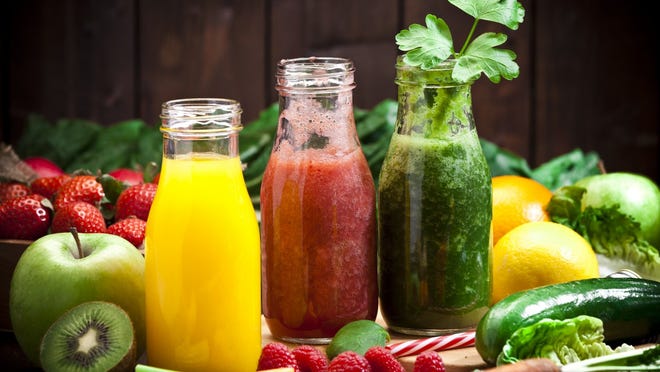
The holidays are over, and it’s that time again — when we start thinking about working off those holiday indulgences and resuming our healthy habits.
Juice cleanses have become a popular “reset” strategy for many people who want to embark on a healthy eating plan.
Sort of a “clean out the cabinet” approach before restocking.
A juice cleanse typically involves drinking nothing except fruit and vegetable juices for several days. The idea is to detoxify the body and kickstart weight loss.
Juice cleanses fall into the category of “detox diets.”
These include various herbal regimens, body wraps, pills and supplements and fasting.
Susie’s previous three columns:
Eat, drink and be merry:Don’t let holiday eating stress you out, enjoy but in moderation
Feeling sluggish:Your diet might be the reason you feel tired all the time
Eat what?Put SMASH fish on your dinner plate and live a healthier life

If you’re thinking about starting one, be smart, and be informed about the reality of how these regimens affect the body. Although a detox diet will result in initial weight loss, that weight is regained rapidly as soon as you start eating normally. And this “weight loss” mostly comes from the loss of water and your body’s carbohydrate stores, rather than fat. Very low-calorie diets trigger the “starvation response” in our bodies, which is a natural protective mechanism. The result is a slowing of metabolism, which makes future weight loss efforts very difficult. The term “detoxification” is, in fact, nothing but a marketing myth designed to promote the sale of worthless tablets, teas, herbal remedies and potions. The truth of the matter is that your body has its own natural detoxification system that works around the clock. Waste products from alcohol, medications, byproducts of metabolism and digestion, dead cells, chemicals from pollution, and bacteria, are all neutralized and removed from our bodies naturally. This is accomplished by the liver, kidneys, skin, intestines and lungs. These organs work in harmony to do the job without assistance from supplements and special diets. Toxins are naturally eliminated from the body in our urine, feces, sweat and even our breath. To give you an example of how efficient our built-in detox system is, if you were to drink an almost lethal dose of alcohol (not a good idea!), your liver will completely clear it all from your body in 36 hours. Pretty amazing, huh? Any highly restrictive diet plan is just a Band-Aid fix. It doesn’t help us form the habit of healthy eating or change our relationship with food. In fact, it perpetuates feelings of guilt and restriction. Good nutrition is important for toxin clearance, so eating a healthy diet is the best detox strategy. Foods that act as natural detoxifiers include olive oil, nuts, tea, red wine, apples, berries, garlic, cabbage, Brussels sprouts, kale, and broccoli. Staying well hydrated keeps the digestive track moving so that waste products can be quickly eliminated. Be sure to drink one-half ounce of water for every pound of body weight. Fiber (from plant foods) helps absorb toxins as they move through the intestines. Physical activity also plays a role in our body’s natural detox system, as it helps stimulate the intestines to move toxins out of the body rapidly, and it activates the sweat glands. So, forget the hype — just eat right! Susie Bond is a Registered and Licensed Dietitian/Nutritionist in private practice. Contact her at NutritionistOnCall@gmail.com

